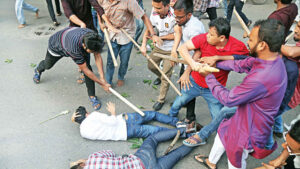BCL attacking opposition activists
By Ahammad Foyez on Mar 10, 2023 Benar News
The Bangladesh ruling party’s student wing has come under increased scrutiny amid reports of its members’ involvement in escalating incidents of sometimes grisly violence on university campuses.
This month the High Court stepped in to order a university to expel five students from the ruling Awami League’s Bangladesh Chhatra League who were accused of assaulting a fellow student.
Awami League leaders insist they punish offending members of its student wing, but some academics and other students said that more often than not there is a culture of impunity.
Reports about the allegedly violent behavior by Chhatra League members aren’t new, but they haven’t been as frequent as in the last few years – or as gruesome.
Bangladeshis did not expect student bodies would become such a violent cesspool, Abul Kashem Fazlul Haque, a senior professor at Dhaka University, told BenarNews.
“Even in our worst nightmares, we did not anticipate that we would experience the kind of student politics that we are seeing today,” Haque said.
When we got independence, “we dreamed that our student organizations would help forge democracy,” he said.
President Abdul Hamid recently brought up concerns about crimes on campus, but he did not name the Chhatra League.
“People do not view student politics with respect any longer,” Hamid said at the graduation ceremony at Jahangirnagar University late last month.
“Whenever one glances at a newspaper, they would notice the reports about extortion and other corruption.”
Recent reported incidents involving Chhatra League members include the assault of a Chattogram student said to be from an opposing group, thrashing of students in several Dhaka colleges, and the extortion and abduction of Rajshahi and Dhaka businessmen.
Bangladesh has had a love-hate relationship with student politics.
In pre-independence Bangladesh, student activists associated with the Chhatra League, along with left-leaning organizations, inspired protests against military rule and contributed to the freedom struggle.
After independence, the Chhatra League and left groups continued to dominate campuses until the formation of the Bangladesh Nationalist Party (BNP) in 1978 and its student wing, the Chhatra Dal, a year later.
After the end of military rule in the 1990s, student party politics began to mirror national party politics, like it did in many South Asian nations, especially where the voting age was 18. Students were a vital source of votes.
Political tussles between the Awami League and the BNP would play out violently between the Chhatra League and the Chhatra Dal.
Barring a brief moment of unity to unseat a military ruler, President Hussain Muhammad Ershad, clashes involving the Chhatra League and the Chhatra Dal continued, with casualties on both sides.
Since 2014, however, the Chhatra Dal, much like its parent party, has been in retreat. That is the year the Awami League’s Sheikh Hasina was reelected prime minister when the opposition boycotted the polls.
Hasina won a third straight term in 2018, cementing her position – and critics say turning authoritarian.
Chhatra League untrammeled
The Awami League’s dominance has meant its student wing’s supremacy.
With barely any opposition, critics said the Chhatra League targets anyone who speaks out against the government, and the ruling party looks away when its student wing targets opposition members or any anti-government groups.
The ruling party’s A.F.M. Bahauddin Nasim denies this.
“At every instance, necessary disciplinary actions have been taken against Chhatra League activists involved in wrongdoing. No one is spared,” Nasim, an Awami League leader tasked with overseeing its student branch, told BenarNews.
He said that given its colossal membership, the Chhatra League disproportionately garners negative attention.
Chhatra League President Saddam Hussain echoed Nasim.
“Whoever commits any crime in the name of the Chhatra League is not spared,” he told BenarNews.
“In every case of crime, disciplinary actions have been taken. In necessary instances, we cooperated with the authorities to initiate legal actions,” he said.
Awami League members note that in September 2019, Hasina, who heads the party, dismissed top Chhatra League leaders for their involvement in extortion and bribery in an infrastructure project at Jahangirnagar University.
Also in 2019, Chhatra League activists at Bangladesh University of Engineering and Technology (BUET) engaged in the torture of a fellow student, Abrar Fahad, leading to his death.
The incident shocked the nation and sparked intense student protests at BUET, forcing the university to ban partisan student politics on its campus. A court in Dhaka imposed the death penalty for 20 and life sentences for five other Chhatra League members.
But there are instances when court intervention failed to bring accountability.
In 2012, the alleged hacking of an opposition member, Biswajit Das, by Chhatra League members was captured on live television. Amid widespread outrage, the court found 21 Chhatra League members guilty, but 13 of them remain at large.
In another incident in 2018, critics said neither the ruling party nor the police took action.
Back then, they allege that Chhatra League members violently dispersed school children who brought the capital Dhaka to a standstill as they protested for better road safety. Some media organizations identified the people involved in the violence, yet no action was taken, critics say.
“There should be justice for the crimes committed by student organizations,” Mohammad Kaykobad, a professor at Bangladesh University of Engineering and Technology, told BenarNews.
“Otherwise, their misdeeds will not stop.”

